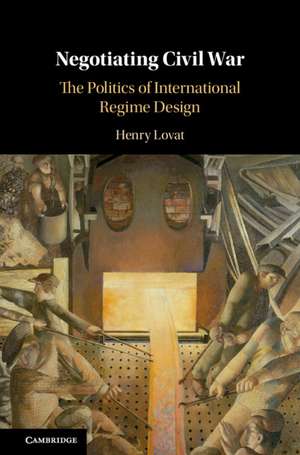Negotiating Civil War: The Politics of International Regime Design
Autor Henry Lovaten Limba Engleză Hardback – 15 iul 2020
| Toate formatele și edițiile | Preț | Express |
|---|---|---|
| Paperback (1) | 231.44 lei 6-8 săpt. | |
| Cambridge University Press – 13 iun 2024 | 231.44 lei 6-8 săpt. | |
| Hardback (1) | 784.65 lei 6-8 săpt. | |
| Cambridge University Press – 15 iul 2020 | 784.65 lei 6-8 săpt. |
Preț: 784.65 lei
Preț vechi: 912.39 lei
-14% Nou
Puncte Express: 1177
Preț estimativ în valută:
150.19€ • 163.19$ • 126.24£
150.19€ • 163.19$ • 126.24£
Carte tipărită la comandă
Livrare economică 21 aprilie-05 mai
Preluare comenzi: 021 569.72.76
Specificații
ISBN-13: 9781108497275
ISBN-10: 1108497276
Pagini: 400
Dimensiuni: 158 x 236 x 27 mm
Greutate: 0.69 kg
Editura: Cambridge University Press
Colecția Cambridge University Press
Locul publicării:Cambridge, United Kingdom
ISBN-10: 1108497276
Pagini: 400
Dimensiuni: 158 x 236 x 27 mm
Greutate: 0.69 kg
Editura: Cambridge University Press
Colecția Cambridge University Press
Locul publicării:Cambridge, United Kingdom
Cuprins
Introduction; 1. Theorising the Civil War Regime; 2. Historical precursors and regime origins; 3. Negotiating Common Article 3 (1949); 4. The Additional Protocols of 1977; 5. War crimes and internal armed conflict in the Rome Statute (1998); 6. Explaining the Civil War Regime; Conclusion.
Recenzii
'The evolution of the 'civil war regime' in the second half of the twentieth Century is puzzling: why would states collectively design (let alone subscribe to) successive sets of treaty provisions with the potential to tie their hands in combating rebel groups on their own territory? Can these developments be accounted for merely by the evolution of international humanitarian conscience, as a certain narrative might suggest? Or was something more contradictory going on, involving a complex mix of material, ideational, social, and strategic factors? Henry Lovat offers a wide ranging, carefully researched, and theoretically informed account of the negotiation of the civil war regime, that is sure to set the tone for future research into multilateral diplomacy amongst scholars of International Law and International Relations.' Frédéric Mégret, McGill University
'An important book that is not just historical or doctrinal, but that offers an analytically structured account of the negotiation processes that produced the international legal regime covering internal armed conflict. Anyone interested in the IL/IR nexus, in international humanitarian law, or in international legal development will be richly rewarded by reading this book.' Wayne Sandholtz, John A. McCone Chair in International Relations, University of Southern California
'Henry Lovat shines light on the development of the law as a process of intertwined political and legal contestation in which moral authority is at least as important as material power in determining outcomes.' Rachel Kerr, King's College London
'In this thoughtful, original study, Henry Lovat breaks new analytical ground, combining lenses from history, international law, and international relations theories to cast new light on how civil wars came to be regulated by the 1949 Geneva Conventions, their 1977 Additional Protocols, and the 1998 Rome Statute of the International Criminal Court.' Harold Hongju Koh, Sterling Professor of International Law, Yale University, Legal Adviser, US Department of State (2009-13); Assistant US Secretary of State for Democracy Human Rights and Labor (1998-2001)
'An important book that is not just historical or doctrinal, but that offers an analytically structured account of the negotiation processes that produced the international legal regime covering internal armed conflict. Anyone interested in the IL/IR nexus, in international humanitarian law, or in international legal development will be richly rewarded by reading this book.' Wayne Sandholtz, John A. McCone Chair in International Relations, University of Southern California
'Henry Lovat shines light on the development of the law as a process of intertwined political and legal contestation in which moral authority is at least as important as material power in determining outcomes.' Rachel Kerr, King's College London
'In this thoughtful, original study, Henry Lovat breaks new analytical ground, combining lenses from history, international law, and international relations theories to cast new light on how civil wars came to be regulated by the 1949 Geneva Conventions, their 1977 Additional Protocols, and the 1998 Rome Statute of the International Criminal Court.' Harold Hongju Koh, Sterling Professor of International Law, Yale University, Legal Adviser, US Department of State (2009-13); Assistant US Secretary of State for Democracy Human Rights and Labor (1998-2001)
Notă biografică
Descriere
A theoretically-informed, critical account of the making of the international legal rules governing civil war.
